Thailand’s Social Inequality and Human Rights
Keywords:
Inequality, Human RightsAbstract
This academic article on Thailand’s Social Inequality and Human Rights was created to express the perspective on the current state of inequality, which results in a variety of issues such as unequal provision of social welfare under government management or inequality on other issues, such as highest educational attainment or educational quality among students at the same educational level. Due to state structure with social stratification, most of the state structure have frequently been shared with the wealthy rather than the poor. According to the problems caused by unbalanced development or urban concentration, benefits obtained from development were insufficient to cover all dimensions of development, including structure, education, and access to social welfares. As a result, resource allocation was unequal, which may have resulted in discrimination against those with less power in the society. Accumulated inequality, including income inequality, educational inequality or inequality by nation, races, genders, ages, sexual orientation, and social class, indicated that the government’s structural management was the cause of inefficiency and ineffectiveness of providing public health services aimed at improving the Thai people’s quality of life. This article aims to educate people about the problems of inequality in contemporary Thai society in order to help them understand the importance of social equality and human rights, including educational rights, public health rights, and freedom of thought. Regardless of our differences, everyone possesses equal human dignity.


